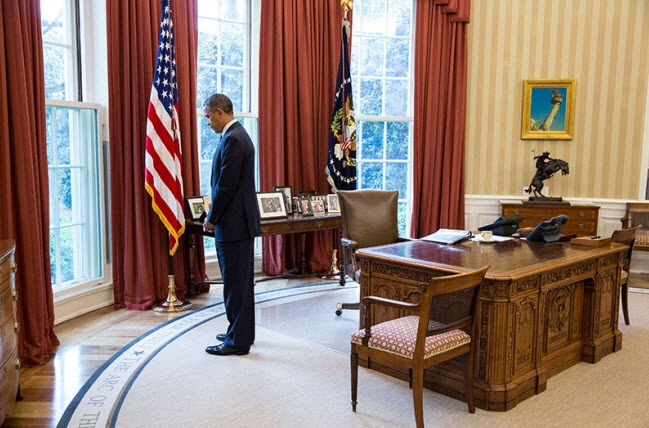Americans, Unclear Who We’re Fighting, Wish Obama Would Tell Us
Always witless, but after Orlando the semantic red herring over the phrase “radical Islam” turned moronic. Since the rise of ISIS and President Obama’s pledge two years ago the coming September that, “We will degrade, and ultimately destroy, ISIL” (his preferred acronym for ISIS), those on the right have seized on the president’s failure to utter those two words alongside To the sensible, it is obvious that the holder of the presidency of the United States must steer clear of the antagonistic blunders of previous administrations that characterized adversarial countries as the “axis of evil”, and in this case not label the entire religion of Islam as “radical”.
It was everyone’s talking point after Orlando, especially on Fox News, which has relentlessly whined about the two word mantra for the better part of a year. On the Monday following the early-Sunday massacre, there was the Fox anchor of the midday “Happening Now” program saying Obama “called the attack an act of terror and hate but he did not use the words ‘radical Islam'”. A regular on the show, Tammy Bruce, a radio talk-show host who freely distorts, was angry at Obama for saying “that it has nothing to do with Islamic terrorism” — right after the show had aired lengthy remarks by the president in which he specifically acknowledged the link of the Orlando killings to ISIS. Eric Boling of “The Five” said that afternoon, “If President Obama can’t say it, it sends a message he can’t put the two [words] together. We’re at war and we need to all join together and realize that’s the enemy”. You would never know we’ve been bombing ISIS since September 2014. The reason they give for why saying “radical Islam” is important takes us from dumb to dumber, yet it is repeated as if the right-wing commentators had chips installed. David Gergen, now a CNN commentator, wanting to show his proximity to the mighty, told Erin Burnett he had advised Reagan not to say the Soviet Union was the “evil empire” but now thinks he was wrong, and that the president should say the magic words. “Having plain-spoken truth about what you’re facing helps to clarify and helps to strengthen your hand”. On Megyn Kelly’s program Monday night was former CIA Director James Woolsey reciting that reason for us once again. Kelly asked “why using the term radical Islam matters” and Woolsey responded, “You can’t fight something effectively unless you can describe it”. What’s he saying? Lacking that description, our pilots have been bombing someone other than ISIS? As in this video, ISIS might differ. backtalk
On Tuesday, the president emerged from a national security meeting and first reported on military progress against ISIS, listing the termination of more than 120 ISIL leaders and commanders; the destruction of their financial sources, not least “destroying the storage sites where they keep their cash”; Iraqi towns overtaken; the reduction of ISIS territory in Iraq by half; closing the circle around Raqqa, the ISIS headquarters town in Syria. “It’s now been a full year since ISIL has been able to mount a major successful offensive operation in either Syria or Iraq.” The complaints are that we have no strategy (except what Obama has been doing for months — air strikes and a refusal to re-invade Iraq — is his strategy), that we have not moved fast enough, that the 12,685 air strikes through May have not been enough. After Obama’s talk, former ambassador to the U.N. under George W. Bush and war-lover John Bolton met with the four ladies of Fox’s noon-day “Outnumbered” in which he reprieved that complaint. Like all other kvetchers who complain that “we must do something” but never come up with the something, it turned out that Bolton doesn’t mean re-invading Iraq. Rather, Obama has failed because he did not put together a coalition to fight ISIS. He failed because he couldn’t command sovereign Arab nations to obey him and send in their armies and is therefore “unfit to be commander in chief”. [6] Obama continued in his talk to finally confront the right wing “radical Islam” obsession. Few heard his noonday remarks, and television reduced them to sound bites, so he is worth quoting at length: And let me make a final point. For a while now, the main contribution of some of my friends on the other side of the aisle have made in the fight against ISIL is to criticize this administration and me for not using the phrase “radical Islam.” That’s the key, they tell us — we can’t beat ISIL unless we call them “radical Islamists.”
What exactly would using this label accomplish? What exactly would it change? Would it make ISIL less committed to trying to kill Americans? Would it bring in more allies? Is there a military strategy that is served by this?
The answer is: none of the above. Calling a threat by a different name does not make it go away. This is a political distraction. Since before I was President, I’ve been clear about how extremist groups have perverted Islam to justify terrorism…There has not been a moment in my seven and a half years as President where we have not been able to pursue a strategy because we didn’t use the label “radical Islam.” Not once has an advisor of mine said, man, if we really use that phrase, we’re going to turn this whole thing around. Not once.
So if someone seriously thinks that we don’t know who we’re fighting, if there’s anyone out there who thinks we’re confused about who our enemies are, that would come as a surprise to the thousands of terrorists who we’ve taken off the battlefield. And the reason I am careful about how I describe this threat has nothing to do with political correctness and everything to do with actually defeating extremism. Groups like ISIL and al Qaeda want to make this war a war between Islam and America. And if we fall into the trap of painting all Muslims with a broad brush and imply that we are at war with an entire religion — then we are doing the terrorists’ work for them.
“Snark in a president is not an admirable trait”, was Bolton’s summation, who calls Obama “a small man”. After all the months of the right wing poisoning their audience against Obama over these two words, all the while knowing why Obama is careful with what he says, as earlier cited, it was “beneath the dignity of the office” for Obama to have his say, said Bolton. And Bolton, too, holds the half-witted notion that we don’t know who we’re fighting until Obama says “radical Islam”: “When you can’t say the reality, ultimately you’re going to impair your ability to deal with it.” No surprise that nothing registered with Donald Trump. With his usual command of incoherence, he as much as said he was unable to understand Obama’s comments — beyond recognizing himself in them. “If you don’t know what the term is…if you can’t say the real name — we have a radical Islamic terrorism problem, folks, we can say we don’t, we can pretend like Obama we don’t, where Obama spent a long time talking about it and nobody at the end of that speech understood anything other than boy does he hate Donald Trump”. Obama had said, “We now have proposals from the presumptive Republican nominee for President of the United States to bar all Muslims from emigrating to America”. For Trump, the president’s failure to alienate all Muslims meant “There’s something going on”. But, even though ridiculed by the president, the right would not give up. It has too much invested in its “talking point”. The day after the president’s remarks, a Wall Street Journal editorial went from dumber to dumbest. Quoting Obama’s questions, “What exactly would using this label accomplish? What exactly would it change?”, the Journal editorial board replied: Since the President asked, allow us to answer. We’re unaware of any previous American war fought against an enemy it was considered indecorous or counterproductive to name. Dwight Eisenhower routinely spoke of “international Communism” as an enemy. FDR said “Japan” or “Japanese” 15 times in his 506-word declaration of war after Pearl Harbor. If the U.S. is under attack, Americans deserve to hear their President say exactly who is attacking us and why. You cannot effectively wage war, much less gauge an enemy’s strengths, without a clear idea of who you are fighting. The need for the magic two words again. But beyond that, in the case of communism and the Japanese, we were fighting entireties. We were combating all of communism worldwide, we were declaring war against all of Japan and all Japanese. In its confusion, the Journal made Obama’s point well, to be careful not to use language that can be taken as a war against the entirety of Islam’s 1.6 billion followers.
And we don’t know who we’re fighting? One has to wonder whether the country will ever recover from the nonstop propaganda war.
each other as the reason ISIS still exists. It is clear that the word went out to Republicans in Congress, the Wall Street Journal, and of course Fox News, where this gripe is almost daily program fare, that all should be making the case that Obama is unaware of the threat because he won’t obey and identify the enemy with their two word incantation. Greg Gutfeld on the Fox afternoon show “The Five” admitted their obsession with, “We’ve talked about this so long our heads will explode”. Not yet, unfortunately.
Where the president went wrong was his viewing what he called merely a “talking point” as something too brainless to be concerned with, failing to realize the effect of such sloganeering with a brainless public.


